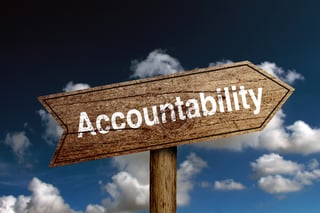Building a Culture of Sales Accountability
Written by: Mike Carroll

 When we talk with CEOs about sales accountability at their companies, we usually hear stories about sales quotas, activities monitored, and how the sales team is either performing or falling short. We rarely hear about how their sales managers actually use the data they track during coaching conversations with individual team members. And we almost never hear about how those conversations change when a salesperson struggles week after week, month after month, and quarter after quarter. Or in some cases, year after year.
When we talk with CEOs about sales accountability at their companies, we usually hear stories about sales quotas, activities monitored, and how the sales team is either performing or falling short. We rarely hear about how their sales managers actually use the data they track during coaching conversations with individual team members. And we almost never hear about how those conversations change when a salesperson struggles week after week, month after month, and quarter after quarter. Or in some cases, year after year.
Here are some questions for you to think about as you consider whether or not you have a culture of sales accountability at your company:
- How do conversations change when your sales managers are working with a low performer?
- Do your sales managers increase or decrease the coaching frequency with a low performer?
- Do they drill down beyond the numbers to the root cause? Are they capable of coaching to that cause? For example, does the conversation shift from “you’re not getting enough appointments….” to “let’s look at who you’re targeting and practice how to engage them more effectively.”
- How are you, as CEO, monitoring the time your sales managers spend with high performers versus low performers? Do high performers get more attention than sales people who struggle?
- How are you, as CEO, monitoring the quality of their coaching conversations and reviewing what they are discussing?
Here’s the hard truth. It's easy to coach when salespeople are performing. It becomes much harder when salespeople are struggling.
- Why? Because sales managers are prone to give second chances (and 3rd, 4th, and 5th chances) for a struggling salesperson to improve.
- Why? There are several reasons but the biggest issue – and the issue that gets the least attention in my opinion – is because most sales managers aren't very good at hiring new salespeople. In fact, they really suck at it.
Frankly, it’s easier to keep giving struggling salespeople another chance than to go through the hassle of finding, interviewing, and onboarding a new salesperson. So instead of working through the tough coaching conversations required to improve performance, it’s easier to just tolerate mediocre results and offer encouragement. Sales managers rationalize this with phrases like, "Well, they'll get better as soon as they get past this trade show" or "If they can just close this large deal, their pipeline's right back on track." It's more of a hope than an actual reality.
What can you do if your salespeople aren’t performing? We recommend implementing a system for coaching and accountability. But that is only part of the picture. We also recommend implementing an effective sales hiring system that allows sales managers to build a virtual bench of high performing salespeople.
Do your sales managers have a system that allows them to maintain a constant search for high performing salespeople while investing minimal time and effort in the process? What would they do differently if they had a constant flow of high performing sales candidates coming to them that they can screen efficiently? How would this change the dynamic of their coaching conversations with lower performing sales people? Would it give them the freedom to comfortably move on from a struggling salesperson who's not accepting coaching and is not committed to improving their performance? What would your revenue look like next year if you had these types of systems in place?
Related Articles:
How to Retain High Performing Sales People
Over the years you may have noticed a difficulty in keeping your highest performing sales people on your team. You may ...
Ready to Build a High-Performing Sales Team?
Let's create your custom Sales Transformation Program.

